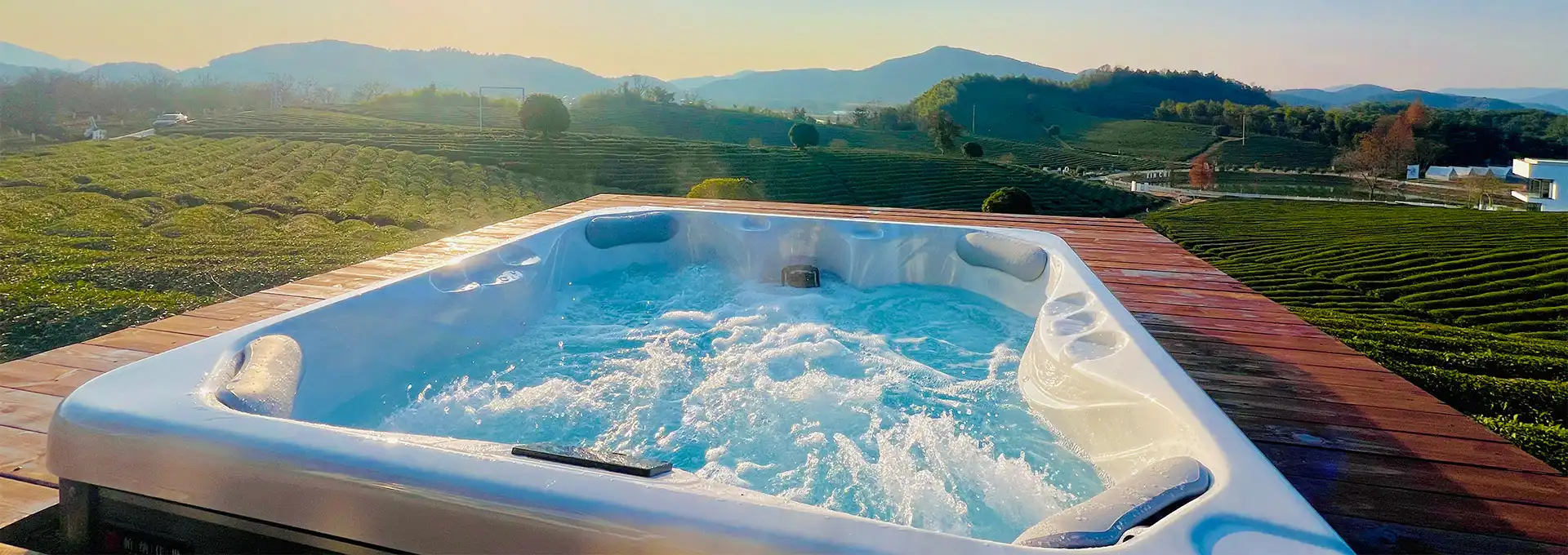Is a Hot Tub and a Jacuzzi the Same Thing?
2025-02-24 14:43:21
When it comes to relaxation and hydrotherapy, jacuzzi hot tub are often mentioned interchangeably. However, while these terms are frequently used to describe similar products, there are some distinctions between them. In this blog post, we'll explore the differences and similarities between hot tubs and Jacuzzis, helping you understand which option might be best for your needs.
What's the difference between a hot tub and a spa?
Although the terms "hot tub" and "spa" are often used interchangeably, there are some subtle differences between the two. Hot tubs typically refer to above-ground units that are portable and can be moved if necessary. They are usually made of acrylic or thermoplastic and come in various sizes to accommodate different numbers of people. Hot tubs are designed primarily for relaxation and hydrotherapy, featuring powerful jets that provide massaging action.
On the other hand, a jacuzzi hot tub can refer to a broader range of water-based relaxation products. While it can include hot tubs, the term "spa" may also encompass in-ground installations that are often custom-built and integrated into a home's landscape or pool area. Spas may have additional features such as waterfalls, fountains, or specialized therapy zones. They are typically more permanent fixtures and can be designed to complement the overall aesthetic of an outdoor living space.
Another key difference lies in the technology and features. Hot tubs are generally simpler in design, focusing on providing a warm, bubbling environment for relaxation. Spas, especially high-end models, may incorporate more advanced features such as programmable jets, smart controls, and integrated sound systems. They might also offer a wider range of hydrotherapy options, catering to specific health and wellness needs.
In terms of maintenance, hot tubs are often easier to care for due to their portable nature and simpler design. Spas, particularly in-ground models, may require more complex maintenance routines and potentially higher operating costs. However, this can vary depending on the specific model and installation.
Despite these differences, both hot tubs and spas serve the primary purpose of providing a relaxing, warm water environment for enjoyment and therapeutic benefits. The choice between the two often comes down to personal preferences, available space, budget, and intended use.
How much does a Jacuzzi hot tub cost?
The cost of a Jacuzzi hot tub can vary significantly based on several factors, including size, features, and quality. It's important to note that "Jacuzzi" is actually a brand name that has become synonymous with hot tubs and spas, much like "Kleenex" for tissues. However, we'll discuss the general cost range for hot tubs, including those manufactured by Jacuzzi and other brands.
Entry-level hot tubs typically start around $3,000 to $5,000. These models are usually smaller, accommodating 2-4 people, and come with basic features such as standard jets and simple controls. They're a good option for those on a budget or with limited space.
Mid-range hot tubs, which often offer more space and enhanced features, can cost between $5,000 and $10,000. These models usually accommodate 4-6 people and may include features like more powerful jets, better filtration systems, and improved energy efficiency.
High-end hot tubs, including many Jacuzzi brand models, can range from $10,000 to $20,000 or more. These premium units often feature advanced hydrotherapy options, sophisticated control systems, luxury finishes, and capacity for 6-8 people or more. Some ultra-luxury models with cutting-edge features can even exceed $30,000.
It's crucial to consider that the initial purchase price is not the only cost associated with owning a hot tub. Additional expenses to factor in include:
- Installation costs: This can range from $500 to $3,000 or more, depending on the complexity of the installation and any necessary site preparation.
- Electrical work: If your home needs electrical upgrades to support the hot tub, this could cost an additional $500 to $2,000.
- Ongoing maintenance: Chemical treatments, filter replacements, and general upkeep can cost $50 to $100 per month.
- Energy costs: Operating a hot tub will increase your electricity bill, typically by $20 to $50 per month, depending on usage and energy efficiency.
- Accessories: Items like covers, steps, and cleaning tools can add several hundred dollars to the total cost.
When budgeting for a hot tub, it's wise to consider these additional costs to get a complete picture of the investment. Many retailers offer financing options to make the purchase more manageable, but be sure to calculate the total cost including interest if you choose this route.
Ultimately, the cost of a Jacuzzi or any hot tub should be weighed against the benefits it provides. Many owners find that the relaxation, stress relief, and potential health benefits justify the investment. Additionally, a well-maintained hot tub can potentially increase property value, especially in regions where outdoor living spaces are highly valued.
What are the benefits of using a hot tub?
Hot tubs, including jacuzzi hot tub, offer a wide range of benefits that extend beyond simple relaxation. These therapeutic water environments can contribute positively to both physical and mental well-being. Let's explore some of the key benefits of using a hot tub:
- Stress Relief and Relaxation: One of the most immediate and noticeable benefits of using a hot tub is stress relief. The warm water and massaging jets help to relax muscles and promote a sense of calm. This can lead to improved sleep quality and overall relaxation, which is crucial for managing stress and maintaining mental health.
- Pain Relief: Hot tubs can be particularly beneficial for those suffering from chronic pain conditions such as arthritis, fibromyalgia, or lower back pain. The combination of heat, buoyancy, and massage can help to alleviate pain by reducing inflammation and promoting blood flow to affected areas.
- Improved Circulation: The warm water in a hot tub causes blood vessels to dilate, improving circulation throughout the body. This increased blood flow can help to reduce blood pressure and promote overall cardiovascular health.
- Muscle Recovery: Athletes and fitness enthusiasts often use hot tubs to aid in muscle recovery after intense workouts. The warm water and jet massages can help to reduce muscle soreness and stiffness, potentially speeding up recovery time.
- Joint Health: The buoyancy provided by water reduces the impact of gravity on joints, offering relief for those with joint pain or arthritis. This weightless environment allows for gentle movement and stretching that might be difficult or painful on land.
- Improved Sleep: Regular use of a hot tub, especially in the evening, can help to improve sleep quality. The relaxation induced by the warm water, combined with the subsequent drop in body temperature after leaving the hot tub, can signal to the body that it's time to sleep.
- Skin Health: While it's important to maintain proper water chemistry, the warm water of a hot tub can help to open pores and cleanse the skin. Some people find that regular hot tub use contributes to clearer, healthier-looking skin.
- Social Benefits: Hot tubs can serve as a focal point for social gatherings, providing a unique space for relaxation and conversation with family and friends. This social aspect can contribute to improved mood and overall well-being.
- Respiratory Benefits: The steam from a hot tub can help to clear sinuses and provide temporary relief from congestion. This can be particularly beneficial for those with respiratory issues or allergies.
- Headache Relief: The combination of warm water, massage, and improved circulation can help to alleviate tension headaches and migraines for some individuals.
It's important to note that while hot tubs offer many potential benefits, they may not be suitable for everyone. People with certain medical conditions, pregnant women, and young children should consult with a healthcare professional before using a hot tub. Additionally, it's crucial to follow proper safety and hygiene guidelines to ensure a safe and enjoyable experience.
Regular use of a jacuzzi hot tub, when combined with a healthy lifestyle, can contribute significantly to overall well-being. Many hot tub owners report improved quality of life, better sleep, and reduced stress levels. The investment in a hot tub can be seen as an investment in personal health and wellness, providing a private oasis for relaxation and rejuvenation in the comfort of one's own home.
For more information on jacuzzi hot tub installations and our products, please feel free to contact us at info@iparnassus.com.
References
- Jacuzzi. (2023). Hot Tub Benefits. Retrieved from https://www.jacuzzi.com/en-us/hot-tubs/products/benefits
- HotSpring Spas. (2023). Hot Tub Cost: A Complete Breakdown. Retrieved from https://www.hotspring.com/hot-tub-buying-guide/cost
- Swim University. (2023). Hot Tub vs. Spa: What's the Difference? Retrieved from https://www.swimuniversity.com/hot-tub-vs-spa/
- Mayo Clinic. (2022). Hydrotherapy: Can it help relieve pain? Retrieved from https://www.mayoclinic.org/healthy-lifestyle/consumer-health/expert-answers/hydrotherapy/faq-20058388
- American Heart Association. (2021). Warm Water Works Wonders on Pain. Retrieved from https://www.heart.org/en/news/2021/03/15/warm-water-works-wonders-on-pain
- Sleep Foundation. (2022). Can Taking a Bath Before Bed Improve Sleep? Retrieved from https://www.sleepfoundation.org/sleep-hygiene/shower-before-bed
- Arthritis Foundation. (2023). Water Exercise. Retrieved from https://www.arthritis.org/health-wellness/healthy-living/physical-activity/other-activities/water-exercise
- National Sleep Foundation. (2023). How to Use a Hot Tub to Improve Your Sleep. Retrieved from https://www.sleepfoundation.org/articles/how-use-hot-tub-improve-your-sleep
- HomeAdvisor. (2023). How Much Does a Hot Tub Cost? Retrieved from https://www.homeadvisor.com/cost/pools-and-spas/install-a-hot-tub/
- Energy.gov. (2022). Energy-Efficient Home Design. Retrieved from https://www.energy.gov/energysaver/energy-efficient-home-design
Send Inquiry
Related Industry Knowledge
- How Long Does It Take to Drain a Hot Tub?
- How to Raise Stabilizer in Hot Tub?
- How Big Should a Concrete Pad Be for a 6 Person Swim Spa?
- Which Mode Saves the Most Energy in My Swim Spa?
- What to Look for in a Swim Spa?
- How Do I Choose the Right location for Installing a 5 Person Hot Tub in My Yard?
- Does medicare cover hot tub therapy?
- How Often to Chlorinate a Swim Spa?
- How Cold Should a Cold Plunge Tub Be?
- How Much to Install a Swim Spa Inground?
_1768872582663.webp)


